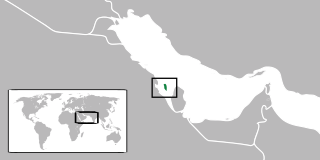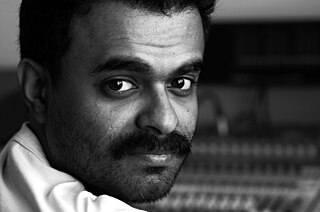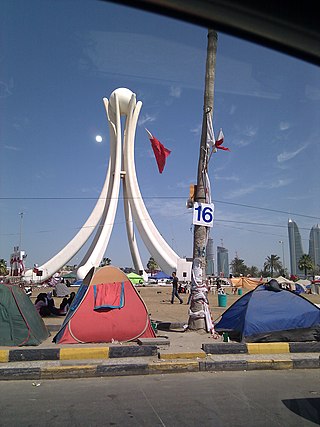Jon Blair, CBE, is a South African-born British writer, film producer, and director of documentary films, drama, and comedy.

Khalid bin Ahmed Al Khalifa is a Bahraini diplomat who served as Bahrain's Minister of Foreign Affairs from 2005 until January 2020. Khalid became only the second foreign minister in Bahrain's history after replacing Mohammed bin Mubarak Al Khalifa who then became Deputy Prime Minister of Bahrain.

Lesbian, Gay, Bisexual and Transgender (LGBT) people living in Bahrain face legal challenges and discrimination not experienced by non-LGBT residents.

Al Ahli SC, also known as Al Ahli Doha is a Qatari multi-sport club based in Doha. It is most notable for its professional association football section. Their home ground is the Hamad bin Khalifa Stadium. Founded in 1950, it is the oldest sports club in Qatar.

Al Khuwayr is an abandoned village in northwest Qatar, located in the municipality of Ash Shamal. It is a popular domestic tourist attraction due to its history and ruined structures.

Al-Wasat, also Alwasat, was an Arabic-language daily newspaper in Manama, Bahrain. Al-Wasat was generally regarded as the only independent newspaper in Bahrain. The newspaper ran for 15 years, during which is provided reporting unique to Bahrain.

Mohammed Haddad is a Bahraini composer and music critic. He is an active artist in the music scene of Bahrain and a leading composer in the film scores of Bahraini films. He is best known for his work on the soundtrack of the critically acclaimed Bahraini motion picture A Bahraini Tale.

The 2011Bahraini uprising was a series of anti-government protests in Bahrain led by the Shia-dominant and some Sunni minority Bahraini opposition from 2011 until 2014. The protests were inspired by the unrest of the 2011 Arab Spring and protests in Tunisia and Egypt and escalated to daily clashes after the Bahraini government repressed the revolt with the support of the Gulf Cooperation Council and Peninsula Shield Force. The Bahraini protests were a series of demonstrations, amounting to a sustained campaign of non-violent civil disobedience and some violent resistance in the Persian Gulf country of Bahrain. As part of the revolutionary wave of protests in the Middle East and North Africa following the self-immolation of Mohamed Bouazizi in Tunisia, the Bahraini protests were initially aimed at achieving greater political freedom and equality for the 45% Shia population.

The GCC Roundabout, known as Pearl Roundabout or Lulu Roundabout (Arabic: دوار اللؤلؤ Dawwār al-luʾluʾ , "Roundabout of the pearl " was a roundabout located near the financial district of Manama, Bahrain. The roundabout was named after the pearl monument that previously stood on the site and was destroyed on 18 March 2011 by government forces as part of a crackdown on protesters during the Bahraini uprising of 2011.

Nabeel Rajab is a Bahraini human rights activist and opposition figure. He is the president of the Bahrain Centre for Human Rights (BCHR), a member of the Advisory Committee of Human Rights Watch's Middle East Division, deputy secretary general for the International Federation for Human Rights (FIDH), member of the Advisory Board of the Bahrain Rehabilitation and Anti-Violence Organization (BRAVO), co-founder of the Gulf Centre for Human Rights (GCHR), and former chairman of CARAM Asia.

Bloody Thursday is the name given by Bahraini protesters to 17 February 2011, the fourth day of the Bahraini uprising as part of the Arab Spring. Bahraini security forces launched a pre-dawn raid to clear Pearl Roundabout in Manama of the protesters camped there, most of whom were at the time asleep in tents; four were killed and about 300 injured. The event led some to demand even more political reform than they had been before, calling for an end to the reign of King Hamad bin Isa Al Khalifa.

As of 15 March 2013, the Bahraini uprising of 2011 and its aftermath resulted in 122 deaths. The number of injuries is hard to determine due to government clamp-down on hospitals and medical personnel. The last accurate estimate for injuries is back to 16 March 2011 and sits at about 2708. The Bahrain Independent Commission of Inquiry concluded that many detainees were subjected to torture and other forms of physical and psychological abuse while in custody, five of whom returned dead bodies. The BICI report finds the government responsible for 20 deaths. Opposition activists say that the current number is 88 including 43 who allegedly died as a result of excessive use of tear gas.
The following is an incomplete timeline of events that followed the Bahraini uprising of 2011 from July to December 2011. This phase saw many popular protests, escalation in violence and the establishment of an independent government commission to look into the previous events.

The following is a timeline of the Bahraini uprising from February to March 2011, beginning with the start of protests in February 2011 and including the Saudi and Emirati-backed crackdown from 15 March.

The Day of Rage is the name given by protesters in Bahrain to 14 February 2011, the first day of the national uprising as part of the Arab Spring. Inspired by successful uprisings in Egypt and in Tunisia, Bahraini youth organised protests using social-media websites. They appealed to the Bahraini people "to take to the streets on Monday 14 February in a peaceful and orderly manner". The day had a symbolic value, being the ninth and tenth anniversaries of the country's 2002 constitution and the National Action Charter respectively.

The March of loyalty to martyrs was a protest on 22 February 2011 in Manama, Bahrain. Tens of thousands participated in the protest, one of the largest in the Bahraini uprising. Named after the seven victims killed by police and army forces during previous protests, the march filled the space between Bahrain mall and Pearl Roundabout. Protesters carried Bahrain's flag and demanded the fall of the government, implementation of a constitutional monarchy and other reforms, with some of them also demanding the end of the regime.

The siege of Eker refers to the Bahraini security forces imposing a lockdown of the village of Eker, situated about 20 km south of the capital Manama, Bahrain.
Abdul Hakim Ibrahim Muhammad Al-Shammari is a Bahraini businessman and politician.

Fareed Ramadan is a Bahraini novelist, screenwriter, and film producer. He is often considered one of the most prominent Gulf novelists and worked to deconstruct the discourse of racism through his work on cultural identities in Bahrain, to the point that some critics called him a "novelist of identities." Among his most prominent works are the novel The English Ocean and the screenplay of the film The Sleeping Tree.

















